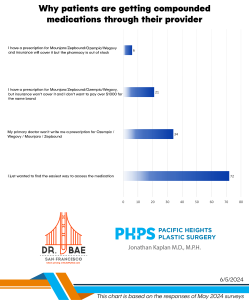Greg:
Hey, this is Greg from Big Bay Mornings on 99.7 NOW, and I’m back with my buddy, Dr. Bae, board certified plastic surgeon. What’s going on, Dr. Bae?
Dr. Bae:
All is well. Thanks for having me, Greg.
Botched
Greg:
My camera’s sliding over here. I’ve got to be careful. I’m banging too much over here. Hey, Dr. Bae, I had a question for you. I’m sure you’ve seen some of this, but I know people are obsessed with that show, reality show, Botched, on E!, right?
But some people really do have an issue. Maybe they have bad plastic surgery. Maybe they had an accident when they were younger in life. Maybe there’s just something on their body that they look at, it just doesn’t look right.
Do you see these kinds of patients often? And I don’t know, I feel like some of them are embarrassed maybe to go talk to anybody about it, and how do you make people feel comfortable going to talk about these issues in your office?
Botched or postop complication?
Dr. Bae:
No, it’s a tough thing because when we’re talking about botched, we’re really talking about just a problem result, or it wasn’t a great result. It doesn’t necessarily mean that anybody did anything malicious, or it was an unqualified person doing it [crosstalk 00:01:10].
Greg:
Or it’s been overdone. Some people get something done five times. It’s like, “Enough already.”
Dr. Bae:
Exactly. There’s lots of different factors. Done too many times, overdone, didn’t stop when they should have, qualified person, unqualified person, or just something didn’t heal the way you wanted when nothing necessarily was done wrong. It’s… people just have to have an open mind that the body heals the way the body wants to heal. And yes, maybe somebody with a little more experience will be able to kind of push the healing in the right direction, but things happen.
It happens to me. It happens to any doctor, even the doctors on the show that talk about botched and look at other botched cases, they’ve had botched cases before themselves. Again, just cases that didn’t come out the way you wanted, but Botched is just a funner word that people like to use, but it really is just a case that didn’t turn out the way you wanted.
Reasonable Expectations
But we have patients who come in who’ve had surgery somewhere else, and that things didn’t heal the way they wanted, and they come in to see me. And so you really just have to start with what’s possible because the truth is the best chance you have of getting something right is the first time you operate on somebody because after that, scar tissue sets in, and so you don’t know how that’s going to respond if you go back in again and introduce more scar tissue because, obviously, you’re building up scar tissue every time.
So when people talk about, “I don’t like the way my scar looks. Can you fix the scar?” Well, they have to understand that to fix the scar as you’re cutting out that scar, replacing it with a new scar and hopefully, maybe this scar will stay thinner this time. Maybe it won’t spread, and you can’t really predict what’s going to happen to everybody for the first operation or even subsequent operations.
So yes, it is. These are tough cases. I do see them. I’m sure somebody else has seen a patient of mine that maybe that patient wasn’t as happy with the result as they wanted to be, and I may not have been as happy as I wanted to be, but you just got to talk to the patient about reasonable expectations of what’s possible. And you kind of hold their hand throughout the whole process and hope to get them where they need to be at the end of the day. And it may take multiple procedures to get them back to that point. And you may eventually be able to hit a home run, and they’re thrilled, or they’ll-
Greg:
And sometimes, you talk about managing expectations and stuff like that. You have to sort of get your mind right. You can’t… it’s like anything else. You have to get your mind right. I’m sure you talk to patients all the time and try to talk them through these things before you just boom, do the surgery.
Dr. Bae:
… right. That’s actually one of the hardest things is I’m here talking about having reasonable expectations, and I’m trying to get a sense from them whether they have reasonable expectations, but I don’t, at the end of the day, know really what’s in their minds’ eye.
I mean, they may say… I might say, “Hey, you may have a little bit of droop after this procedure because there was so much excess skin, and there’s a fear of injury to the nipple if we do too much of a lift.” And so they’re like, “Well, no, I’m all right with those scars. I’m all right with a little bit of droop.” But then after the operation, “Well, that’s too much droop, or are those too many scars?”
And even though we might’ve talked about all of these things explicitly, at the end of the day, you don’t really know what the patient’s thinking, and the patient maybe can’t read my mind either. So it’s a very tricky situation, and the only thing I can say is communication before, during, and after the operation is key.
That’s why I give patients my phone number. I call them the night after the operation, give them my phone number so that instead of them going online and reading things that may or may not be true that I wish they would just call me, text me, send me a photo, so we can hopefully nip any confusion or miscommunication in the bud.
Greg:
And I appreciate your honesty. I’ve been to your office several times, and I’ve asked you to make me look like Michael B. Jordan or Zac Efron. And I bring in the picture, and you’re just like, “Sorry, it’s just not possible,” and I go off again, then I come back with another photo. So I’ll just keep trying. We’ll see. But I would love to [crosstalk 00:04:54] with that perfect body.
Dr. Bae:
You come in wanting to look like Kate Middleton with the nose, and I’d tell you we can’t do that either.
Greg:
Well, I’d like you to stretch me. I’d like… I’d kill to be 5’11” or 6 foot.
Dr. Bae:
There are-
Greg:
That’s not possible, is that?
Dr. Bae:
… there are surgeons in the… I don’t know about the US, necessarily. I guess there’s surgeons everywhere, but I know for sure in Europe, there are doctors that do limb lengthening procedures, and they tend to lengthen the femur which is… I’ve seen these results, and maybe they’re getting better techniques now, but I’ve definitely seen patients who come in, and they want me to fix the scars associated with the pins that were going into their femur to lengthen their femur, so I know that this exists.
Greg:
[crosstalk 00:05:31].
Dr. Bae:
But the funny thing about it is that they lengthen their femur, and it’s all disproportionate. They got these shorter legs below their knee, and then they got these tall femurs and yes, it’s given them height, but you can kind of-
Greg:
It’s bizarre looking.
Dr. Bae:
… it’s bizarre… it’s reverse stilts. It’s very odd.
Greg:
All right. I’m going to skip that one, though. I’m fine.
Dr. Bae:
[crosstalk 00:05:48].
Greg:
I’ll just stay where I am. Dr. Bae, where does everybody find you?
Dr. Bae:
They can find me right on my website, www.realdrbae.com. Thanks so much for watching us.
Greg:
All right, thanks.
Click here for the original blog post written by Dr. Kaplan for BuildMyBod.




